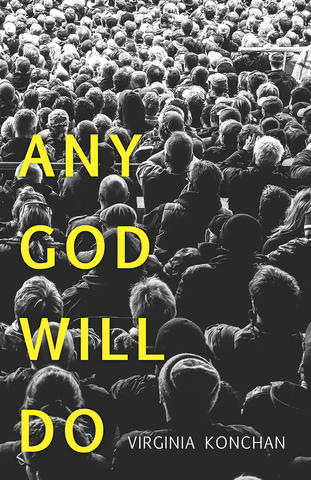
Asking the Impossible
Any God Will Do, Virginia Konchan. Carnegie Mellon University Press, 2020.
While reading Halifax-based poet Virginia Konchan’s second collection, I experienced my capacity for feeling — in the broadest, most contradictory sense — expand. In fact, Any God Will Do seems to me essentially about excess (of feeling, of stimulus, of being) and about the idea of divinity as an overwhelming localization of the too-much.
First of all, Konchan’s speaker is excessive in the most compelling ways. Alternately restless, pained, in awe, self-mythologizing, and completely earnest, her voice matches Berryman’s Henry for its ludicrous theatricality, its self-aware self-obsession, and for striving at once for oblivion and more life. You immediately get a sense of this tumultuous speaker in the collection’s opening lines:
Don’t mess with a woman
from Texas. No, I’m not
from Texas, but I was raised
by wolves. In saying that, though,
am I appropriating the experience
of those literally raised by wolves,
as I was only using it as a metaphor
for neglect?
Throughout the book, the speaker is confronted with the boundaries of self and reinvention. At one point, she apprehends: “Beyond the I, the I.” However, whereas this statement suggests some inescapable perceptive limit, it is immediately followed by a relentless drive toward the impossible:
I have spent my life searching
for a word that I cannot, will not, know. Something
to do with the exhaustion of the possible, enchantment,
desire, and an unwillingness to breed.
In spite of the weightiness of this endeavour, Konchan’s voice is also deeply funny. Take the poem “I Love Hamburgers,” which begins: “As Thich Nhat Hanh said, you should not say / I love hamburgers, as love is a sacred word / that should be reserved for the flesh, or soul.” Much of the humour of this poem (as with many others in the book) can be attributed to Konchan’s poetics of the frenzied list, of her wild leaps from stimulus to stimulus. This poem, for example, jumps from Thich Nhat Hanh’s thoughts on hamburgers, to Virginia Woolf, to Noah’s Ark, to lipstick, and ends with “God again” (to name only a handful of the leaps). Although these poems are unfailingly (sometimes annoyingly) packed with a quicksilver content, they are, as a result, beautifully atmospheric. To clarify, a great unnameable desire (pensive, mournful) filters through the poems, summoned by a din of superficial, yet not unwarranted, cravings. To clarify even further, these poems are larger than life, but don’t presume to find sublimity outside the materials of life.
I find it refreshing how Konchan’s poetics avoid easy answers or anything approaching logical soundness. Instead, the poems suggest that living with paradox is perhaps the only honest way of living in the world. However, Konchan’s speaker does not simply understand uncertainty as an unavoidable, if often unfortunate, force (as most poets do), but alters her perceptions in endless pursuit of it. The poet exemplifies this feeling when she quotes Deleuze at the start of her book: “That the impossible should be asked of me, good, what else could be asked of me?” Along these lines, the book’s titular poem ends:
We were celebrating the end of illusion,
which is dangerous. We need our dreams.
Lying to my face, after asking you to swear
to god, any god, is how I will remember you.
Konchan’s poetics hover at “the hour between disbelief and ecstasy,” passion and nostalgia, illusion and its rejection — without, I think, making a claim for one state over its opposite. When I write that her poems exist within a space of paradox and uncertainty, I don’t mean to imply that Konchan comes across as being at ease with inhabiting this space. Rather, the poems make a claim for a necessary unease. Dissatisfied with the limits of language, reference, and consumption, Any God Will Do makes clear, in the collection’s first poem, that its pursuit is hopeless yet beautifully vital:
There is no way to describe
the sublimity of music
entering a room suffering
under a gag rule for years.
If I can learn to do that,
my God, I will have won.
— Dominique Béchard
is the author of One Dog Town











Add new comment